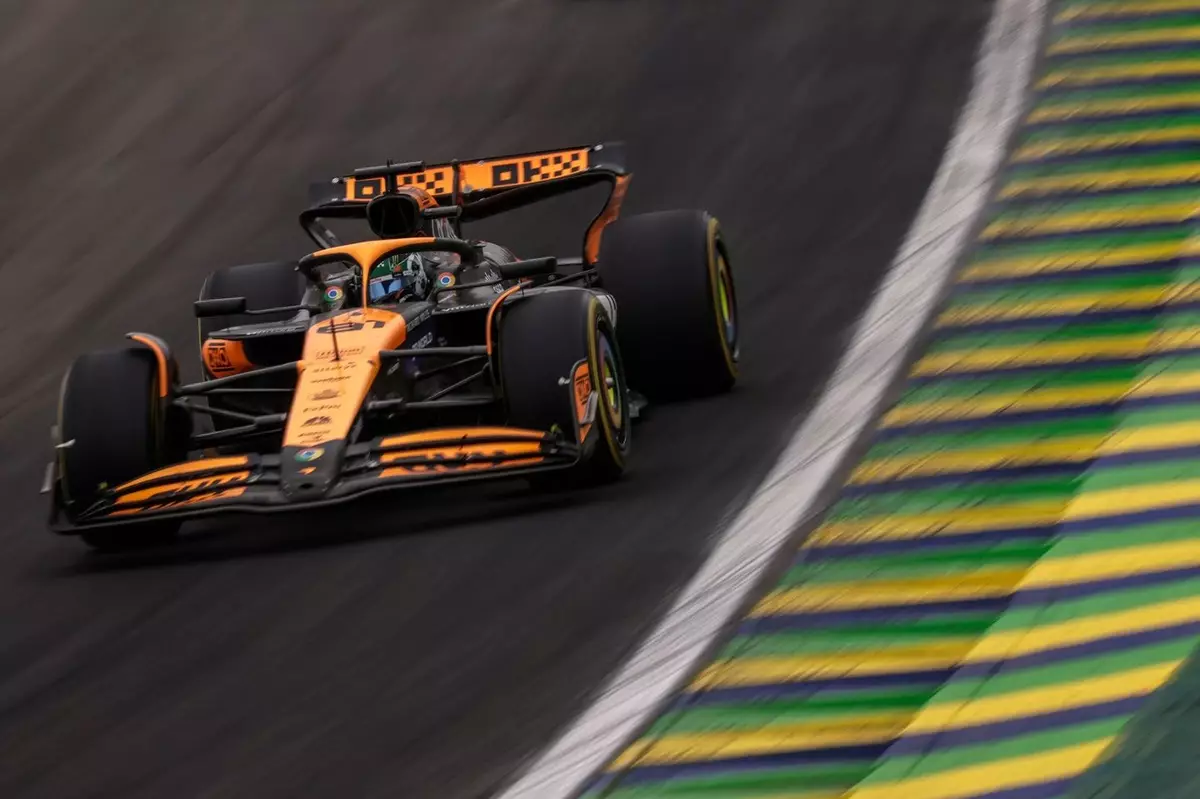The Brazilian Grand Prix turned heads during its sprint qualifying as Oscar Piastri edged out his teammate Lando Norris, showcasing the potent form of McLaren on the ever-challenging Interlagos circuit. While Formula 1 fans have grown accustomed to the fierce competition at the front, this qualification session revealed a surprising shift in power dynamics, with McLaren at the forefront of this season’s sprint format. Piastri’s minor yet significant edge over Norris by merely 0.029 seconds emphasizes the razor-thin margins that define elite motorsport.
Norris entered SQ3 with a clearly effective strategy, securing an impressive lap time of 1m08.928s on his initial attempt. However, it was Piastri’s ability to adapt and respond to track conditions that ultimately secured him the pole position. While both drivers chose to utilize the soft tires, their differing approaches illustrated McLaren’s well-honed strategy and understanding of tire management on the newly resurfaced track. This blend of raw talent and team skill has placed McLaren in a commanding position, significantly raising expectations for the remainder of the race weekend.
One of the most striking narratives from SQ2 was the unanticipated departure of Lewis Hamilton. A seven-time world champion, Hamilton’s failure to advance was not only shocking but a pivotal moment that highlighted the unpredictability of Formula 1. His elimination set the stage for a dramatic shift, as Mercedes found themselves at a disadvantage compared to their rivals. Furthermore, Sergio Perez’s struggle with his newly modified Red Bull RB20, resulting in a 13th place finish in SQ2, added to the day’s surprises. For a driver of Perez’s caliber, this performance falls short of expectations, raising questions about the current state of Red Bull’s machinery.
The circumstances that led to Perez’s exit were particularly dramatic; his inability to complete a crucial lap due to poor timing had significant implications for the team. The pressure on drivers like Perez to deliver results intensifies, particularly with his teammate Max Verstappen performing consistently at the front. The juxtaposition of Perez’s struggles with Verstappen’s performance is indicative of deeper team dynamics at play, suggesting a potential internal struggle as Red Bull navigates the remainder of the season.
Among the sea of established names, Oliver Bearman impressed once again her performance in the Haas car. Despite facing setbacks, including a near-miss in the Senna S and a time deletion due to track limits, Bearman’s resilience speaks to the bright future ahead for this talented young driver. His ability to compete among more experienced drivers, coupled with his evident potential, highlights the encouraging new talent entering the sport.
Bearman’s experiences also serve as a reminder of the fine line that separates potential from success in Formula 1. His near-flawless first lap, combined with an unfortunate incident that led to a deleted time, underscores the importance of precision and consistency in sprint format racing—elements that can heavily influence a driver’s trajectory in the sport.
Competitive Landscape
As the overall landscape of Formula 1 continues to evolve, the outcomes of events like sprint qualifying paint a picture of fierce competition and shifting alliances. The eradication of traditional hierarchies within the paddock is apparent, with both McLaren’s impressive outing and the unexpected challenges faced by established drivers like Hamilton and Perez. The emergence of McLaren as a genuine contender not only adds excitement to the races ahead but underscores the dynamic nature of both strategy and execution in the sport.
As the Brazilian Grand Prix unfolds, all eyes will be on how these qualifying sessions translate into race performance, especially with the implications of tire strategy, team dynamics, and individual driver strengths all playing critical roles. In a sport where every millisecond counts and where yesterday’s results can be tomorrow’s history, the stakes couldn’t be higher for drivers aiming for glory.


Napsat komentář